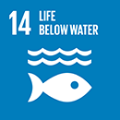This Nereus research project proposes to address the political stalemate that is undermining the sustainable management of the Pacific tuna fisheries, the world's largest tuna fishery. Unless resolved, overfishing will impact on the long term sustainability of these fisheries, resulting in significant conservation concerns, and limiting the future development opportunities for some Pacific small island developing States.
Tuna Governance
Scientific assessments of the four key tuna species have advised that governments need to reduce overfishing of bigeye, avoid further increases in fishing for adult yellowfin, reduce the fishing mortality of juvenile bigeye and yellowfin, and develop precautionary limits for skipjack. Earlier work by A/Prof Hanich and Dr Ota found that the negotiation of sustainable fishing limits was undermined by poor processes for evaluating potential conservation impacts on States with an interest in the fishery, and a lack of clear decision rules to guide negotiations.
This project aims to develop and demonstrate an innovative process to evaluate the impacts of alternative conservation measures on national interests, and provide clear principles for decision-making. This will enable more informed and effective decision making processes to choose between alternative management options and adopt necessary conservation measures, with clear conservation and development outcomes.
The team
- Associate Professor Quentin Hanich - ANCORS, Faculty of Business and Law
- Professor Andy Davis - Biological Science, Faculty of Science, Medicine and Health
- Dr. Marian Wong - Biological Science, Faculty of Science, Medicine and Health
- Associate Professor Karen Charlton - School of Medicine, Faculty of Science, Medicine and Health
- Dr. Joanna Russell - School of Health & Society, Faculty of the Arts, Social Sciences and Humanities
- Dr. Aurelie Delisle - ANCORS, Faculty of Business and Law
- Brooke Campbell - ANCORS, Faculty of Business and Law
- Ruth Davis - ANCORS, Faculty of Business and Law



 .
.  .
.  .
.  .
.